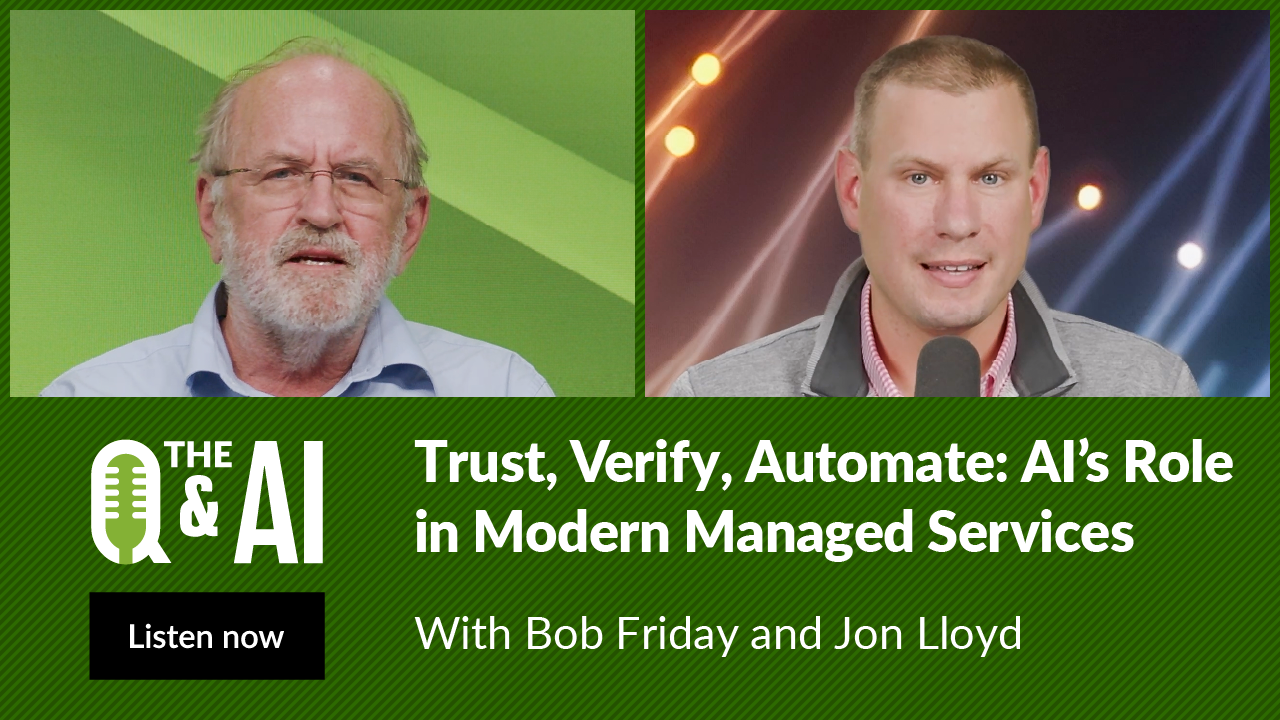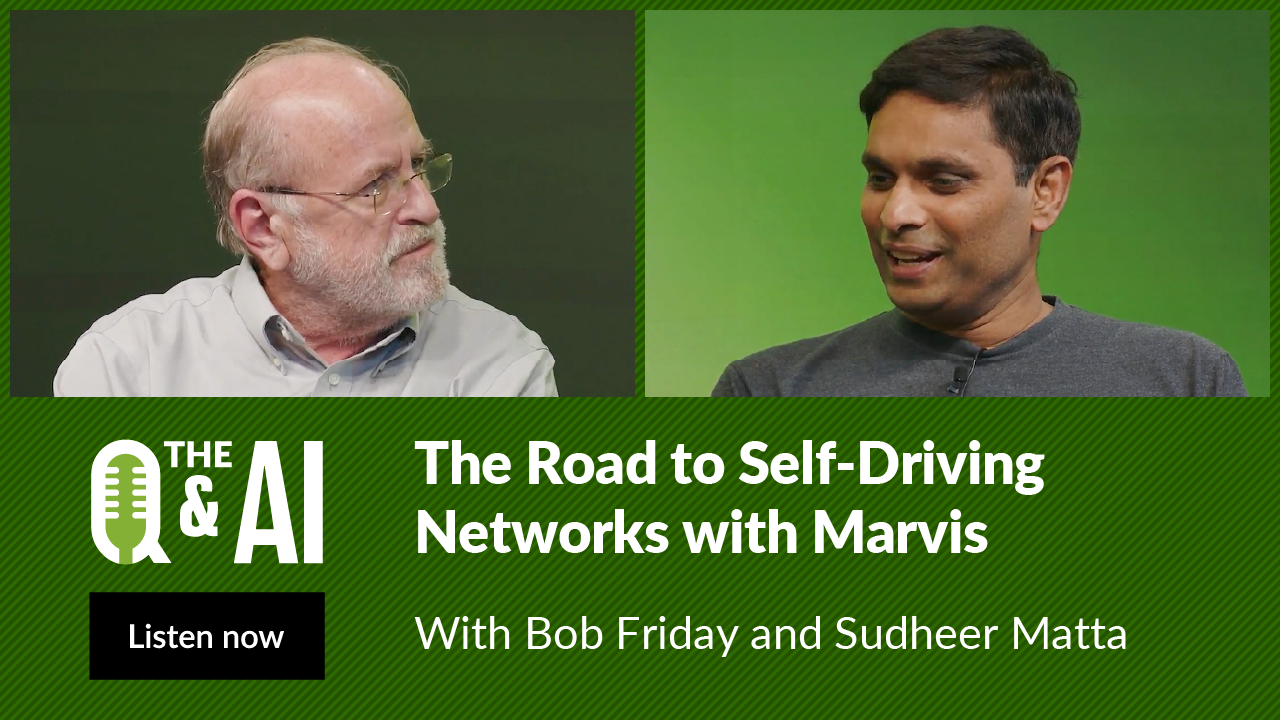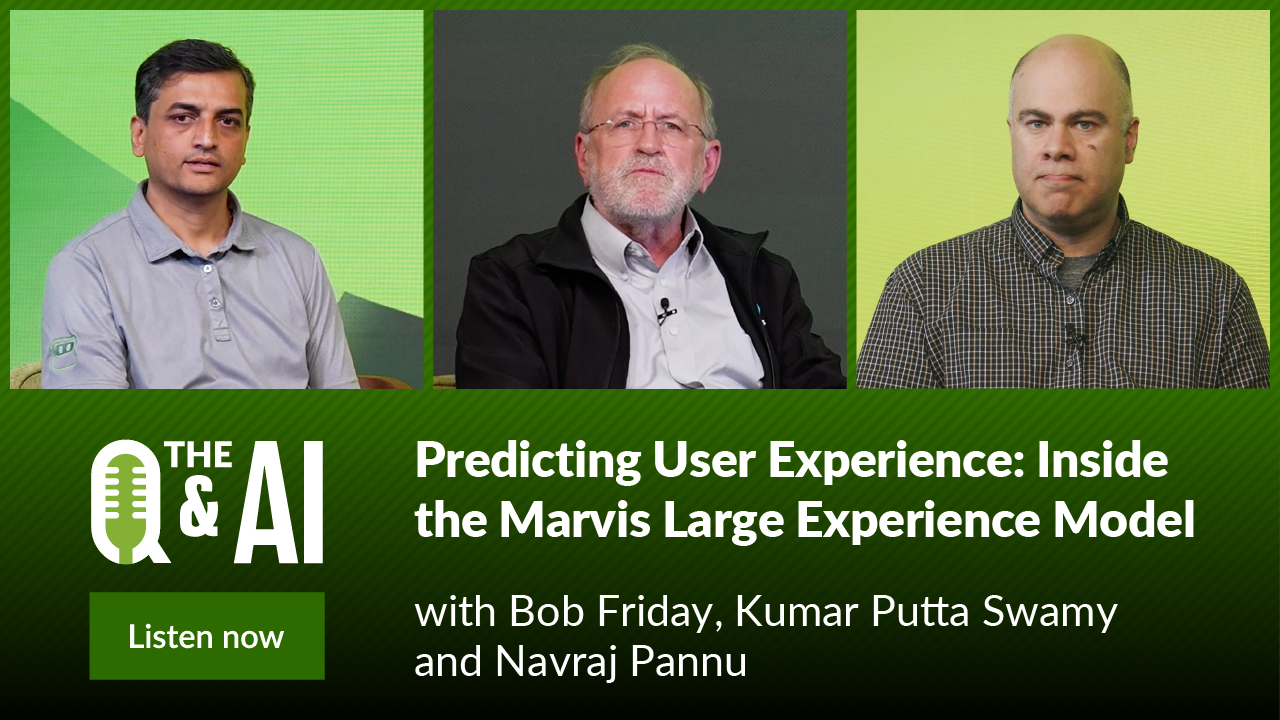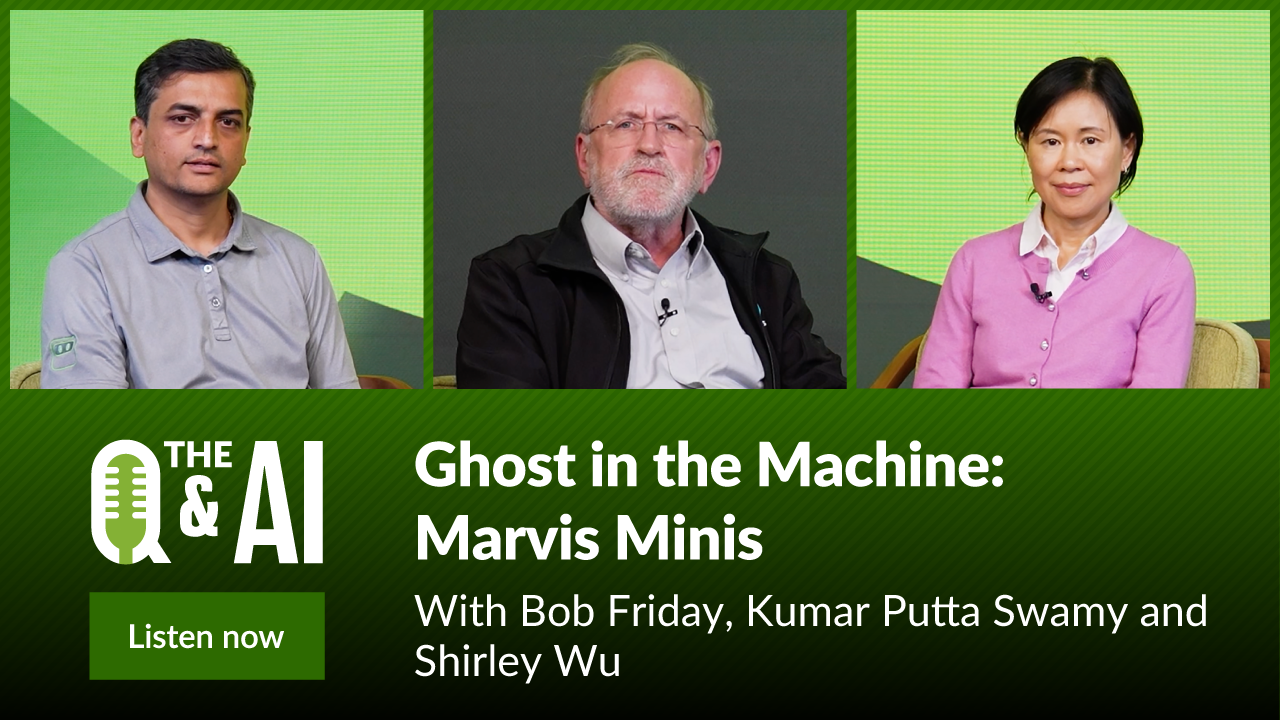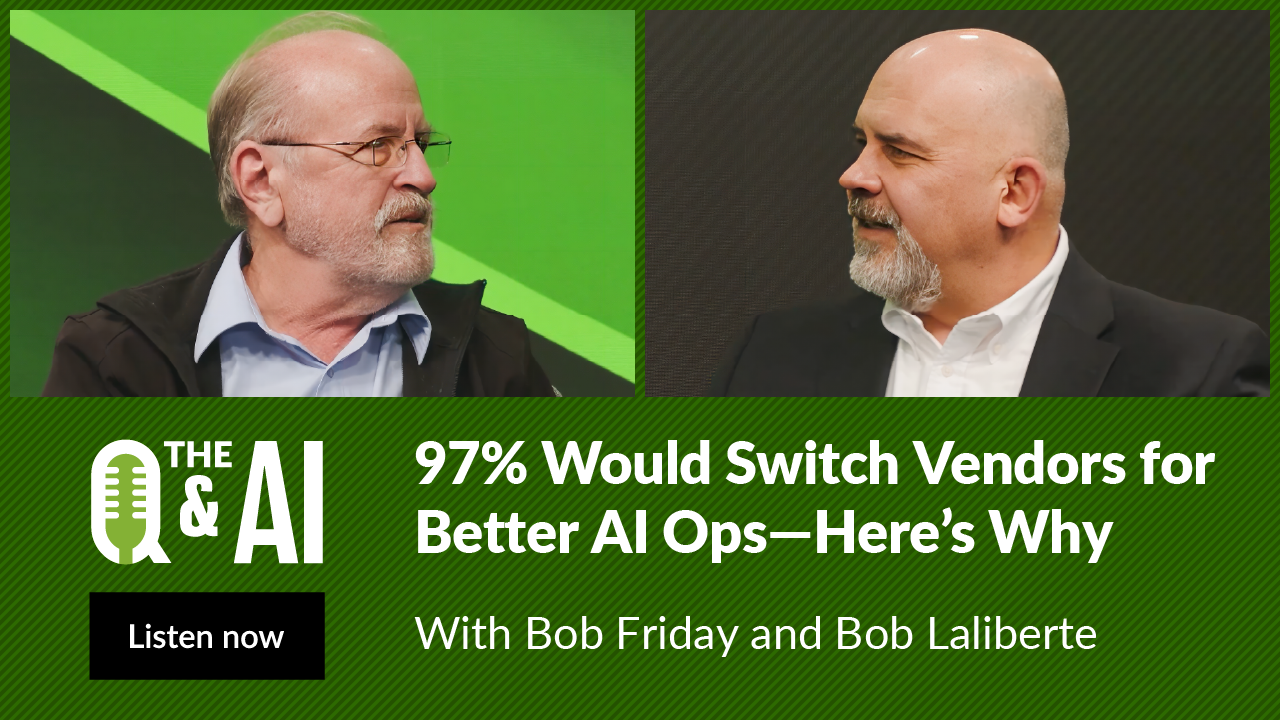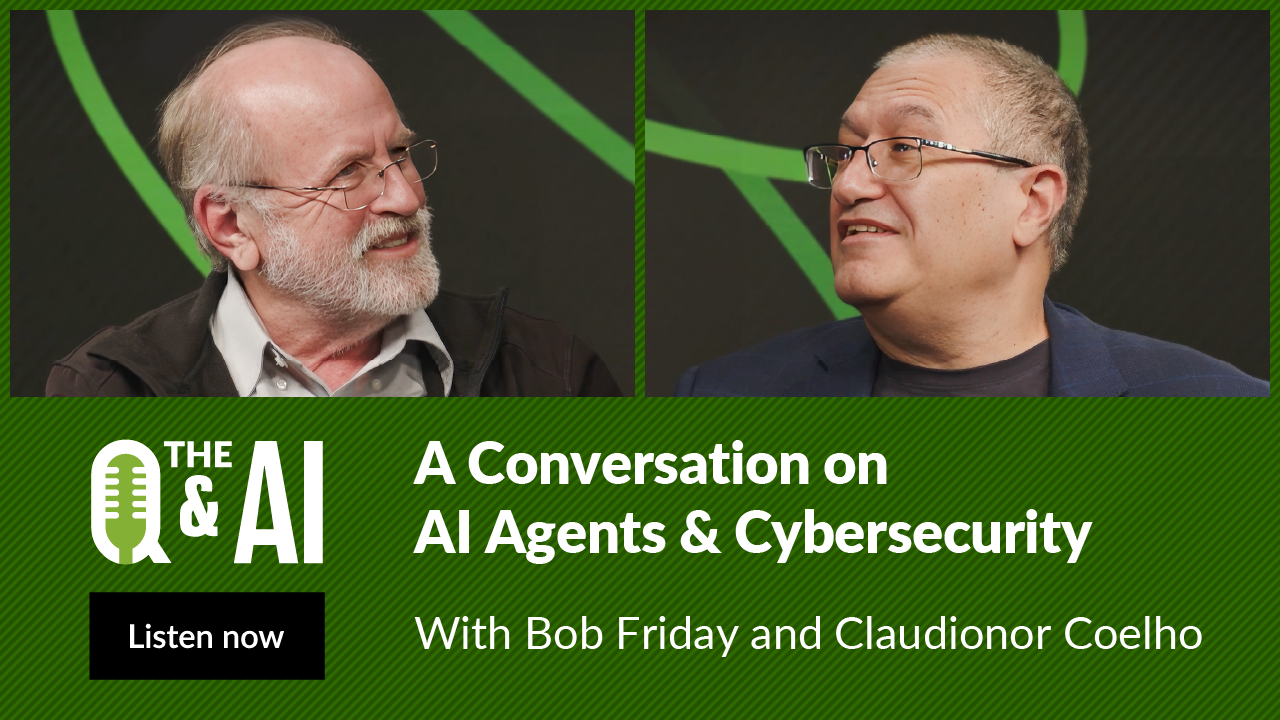The Q&AI: AI as a Team Member: The Future of Collaborative Work

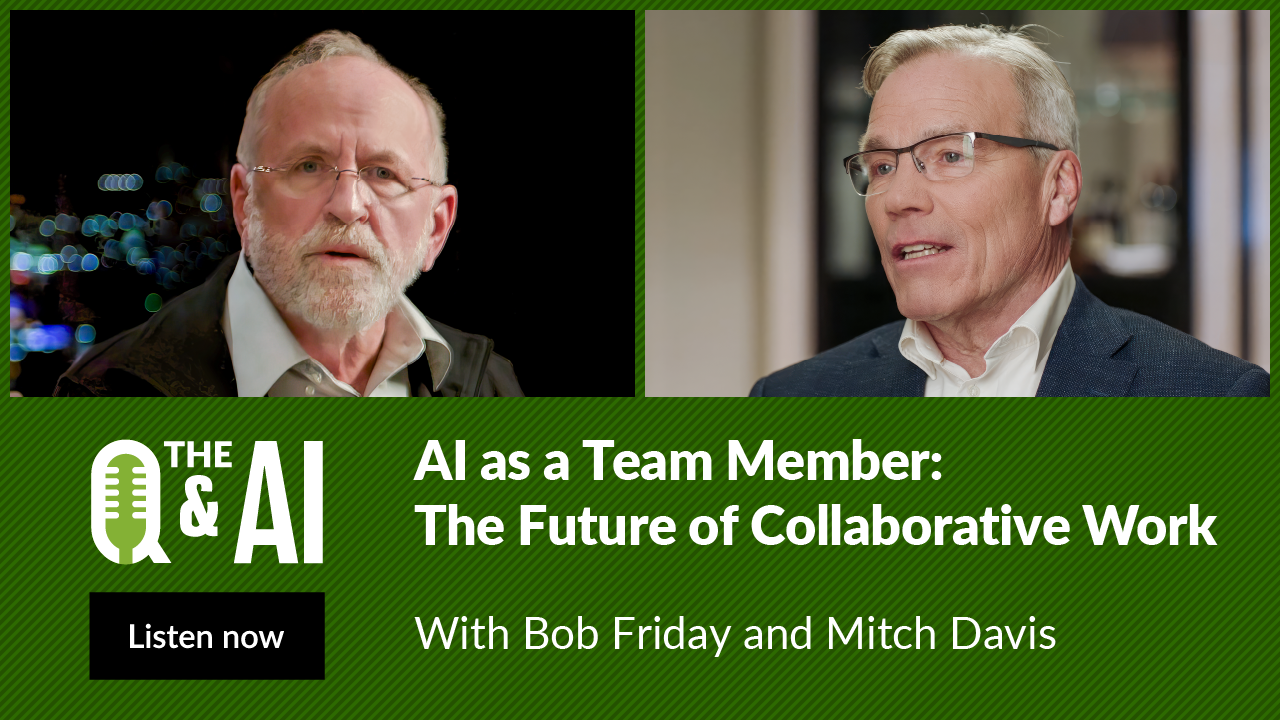
Episode 10: AI as a Team Member: The Future of Collaborative Work
In this episode of The Q&AI Podcast, Juniper’s Bob Friday sits down with Mitch Davis, CIO of Dartmouth College, to discuss the art of building high-performance teams. Mitch shares his strategies for breaking down silos, fostering collaboration, inspiring innovation, and creating a culture of trust and success. Whether you're in tech or any field that values effective teams, this conversation is packed with actionable insights and transformative ideas.
You’ll learn
Inspiring transformation: Using mission and vision to empower teams and drive growth
Developing talent: Mentoring team members to reach their full potential
AI integration: How tools like Juniper’s Marvis enhance team performance and innovation
Who is this for?
Host

Guest speakers

Transcript
Bob: Welcome to another episode of Bob Friday Talks. This is a special episode coming to you from Las Vegas. We're at Juniper's Executive Circle CIO event, and today we have a special guest, Mitch Davis, CIO from Dartmouth. And today we're going to be looking at building special teams. How do you build high performance teams with that Mitch, maybe give the audience a little introduction on your background.
Mitch: I've been in tech since probably I was born. I grew up in the HP labs. My dad was head of R&D and out of college, started working in tech, went on to work for University of Oregon as a CIO, and then went off to Stanford, did the same thing, then to Bowdoin College for 14 years. And now Dartmouth always involved with deep tech networking and everything that was going on new.
Bob: Yeah, since I've known you for probably ten years or so, and I've always known you as kind of the transformational CIO, it seems like when they bring you in, they are trying to transform their program. For myself, I always tell people that startups are like the ultimate team sport, right? And I've known you brought high performance teams.
And everywhere you've gone you've built high performance teams. So, I thought maybe we spent a little bit of time. You're looking into what does it mean to build a high-performance team? You know, what is your recipe?
Mitch: I think most places you go into this, when I go in, there's silos. They're not only siloed individually, they're siloed by department. And so, they work against each other at odds. And if you're going to one, I'm always limited as to hiring more people. And that doesn't always solve the problem is I find that by bringing people together you can get more done quickly, but then you have to value each other. You have to build trust, you have to build all these things and take down those walls that create those silos.
And a lot of them have been put in place for a long time. So, I usually call it we're going to matrix the department. And that basically means I will pull people out of departments, put them in other departments.
Bob: Okay. You know, because everything while looking at the startup space, for me, it's always been, you got to have a rockstar CEO, you got to have a rockstar product management. You have to have a rockstar engineering team. You have to have a rockstar marketing teams. And when those teams come together, it's just like magic watching it happen.
Mitch: I think in teams the way you want, but you don't always have rockstars. So, part of your job as a CIO is to develop people and give them the idea that they can be better than what they are.
And the way that you grow those individual teams is you. One advance a person's skill set to get them to believe in themselves and then to get to believe in their team. And then once they do that, they actually go someplace they've never been. And I find as I move people into that rockstar status, nobody wants to go back. They all want to go for it, and they start carrying everybody else with them to that place.
Bob: So maybe I limit it to how do you identify talent, though? I mean, it's like, when you build a team, I always tell people your plan has to be built on the team you have not the team you wish you had.
Mitch: Right.
Bob: Do you have any recommendations? When you actually have to evaluate different members of the team?
Mitch: I think part of the CIO's job is inspiration, a lot of people have worked in uninspired places. They had no vision, they had no mission. They came to work and did their job, and they felt that that's all it meant to be working somewhere.
And you may inherit that team. But what I find is most people once given a vision and a mission and given the opportunity to develop the skills that they need to move forward, they sort of rise to the level.
Bob: Okay, so you do almost the same thing I do. When you do a startup, you have to have a vision.
You're on a mission, so it sounds like, when you go into a new role as CIO somewhere, you're almost building a startup from inside.
Mitch: Again and again and again. And the same thing, your passion, your desire, your sort of need to succeed actually transfers to your staff and everybody else is you can carry everybody.
And I've proven this in the sense that I showed at a, associate CIO. What happens when you walk in and you don't have energy and you're down and you let people know you're sick? I did this with her to show her how much she had to own her leadership when she walked in the door. And so we went for a day, walked around, told everybody I was sick, told them I was down, told them I was this by the end of the day.
What was everybody talking about? Talking about me and how down they were. I know they were worried about their jobs all of a sudden, and that was just in one day. So, a person, the leader of any organization who's building strong teams needs to be that cheerleader, that sort of inspiration day in, day out.
Bob: Yeah. I mean, you're kind of echoing we just got done listening to Kevin O'Leary down there on the concept leadership and everything. Same thing. What are the top things you look for in a leader right now in your team?
Mitch: I look for creativity that also a person who is willing to take risk and, who can inspire people they don't. In fact, a lot of the times, people who end up being some of my best leaders never knew that.
I mean, you know, people that I work with and there are people that start out just working in a network and they go on and they end up being CTO and everything, and they've become inspiring leaders not only for themselves, but for everybody they touch and talk to them.
Bob: I know you are a CIO Dartmouth right now. Maybe give the audience a little bit of example, specifically at Dartmouth, when you got there, what was the situation and what was your first step on trying to bring that team back to life?
Mitch: The situation was they'd basically been moribund in the sense they had two principles of operation default to no and make no noise. That was their goal as all of the IT Department, 150 to stay under the make no waves. Stay under the radar and I immediately told him we're going to make a ton of noise and we're going to default to maybe you're. Yes. And we're gonna find a way to get that done. And when I found resistance within those groups, I started noticing pockets of resistance.
But also, I created mentoring groups for people that I sat on and worked with people. And you create a group of acolytes within your department that are buy into the mission, buy into the inspiration, buy into the opportunity that something can be different than what I've had in the past. And when you create that sense of difference and all of a sudden people succeed, other people start noticing them succeeding.
And again, a transformation of a large group of people, 200 people, doesn't happen overnight and that you're going to disrupt. And so, people thought, in my office I had a, chaos spilled out on my bookcase, and they thought I was all about creating chaos. So, I waited about six months, and then I put order on my other bookcase and the other side of my desk, and I explained to them, yes, we create chaos, but we also find order out of that chaos.
And our goal right now all together is to find that order. It's not to go back, but it's to find a way to work forward in which we're going to be exceptional. We're going to do things they've never done.
Bob: Yeah, that's kind of extreme. That creation of success, that something to success. Because, we heard that today in this afternoon right with Kevin and yeah, that concept of if you have a team that, got a goal 17% and hit their goal 95% of the time versus a team that's got a 30% goal and hits a 65% time, you know, the team doing 17% is actually going to be more successful. Right. You want to get that culture of success going around that mission, that vision.
Mitch: So that brings up, as the CIO is don't make the mission impossible, right. Is make the mission palatable. Also make it so they're challenged. You're disrupting them and they're disrupting the way they work. But they find success in the end of that.
And then you can continue to do that every time somebody of disrupted, they've been changed a little bit and they move forward and they find success, you can disrupt them again to the point where living in that state of change is where you want them. And so, what you want to do with your clients and with your, staff is to create a change, positive environment where change is seen as a positive and not a negative, and remove the resistance from your clients, remove the resistance from your staff so you can execute at a faster rate and a more successful one.
Bob: Okay, well now this shows a lot about AI. I know you're a big virtual gamer. And we talked about that a little bit, where do you see AI, I mean we both play around with these Apple provisions right.
Mitch: Right, right.
Bob: Do you see AI, augmented reality playing into teams of the future?
Mitch: I already think of I as a team member. If you look at what is done in our programing group, it's infiltrated that it's part of the team. And so, as AI grows it, I think it will infiltrate more and more parts. Our marketing group definitely engaged with AI, ChatGPT4 for that's a common conversation. This whole thing with notebook LLM building these podcasts, being able to distribute them out just from content that we have, explaining very complex things and very easy ways that the AI is going to continue to ramp up and always be a tool, but also somewhat of a partner thinking about how we could do better.
Bob: Yeah, seriously, you say that because my space, it's all Marvis, cloud ops networking. And I always tell IT teams. Oh, you got to look at these virtual AI assistants as a new partner.
Mitch: Marvis is a partner. To our teams, to our service desk, to our network it is a partner. And they see it that way. And they talk about Marvis as an entity.
Bob: Yeah. And I think this challenge is, in this, we're building things or doing things on par as humans that are non-deterministic. And I tell people you have to learn how to trust your AI assistant like a new employee. Right.
Mitch: But Marvis has earned that. Remember Marvis but Marvis 1.0 is not Marvis today.
Bob: Yes. I think we're still on the journey. We're not to the Waymo Uber autonomous driving vehicles. But it's amazing we're getting there. So, maybe a final words of wisdom for anyone out there trying to build high-performance teams.
Mitch: Is look at yourself first. And are you the leader that you need to be to be able to create that team? And are you creating environment that supports, risk within the environment for your staff? So, their creative aspect of themselves and their ability to change is supported. If you create a safe environment for people to grow, they'll grow where you need them to go.
If you don't, if you restrict them in any way and you place that risk on them because I think a lot of people when somebody screws up, they say, that's your fault. Anytime anybody works for you and you've assigned them a task, if they fail, that's your fault. You own that and you let them move forward and learn, because you want to create a learning environment that's constantly growing.
Bob: Okay. Well, Mitch, I want to thank you for joining us on this episode in Vegas. And I want to thank you, the audience, and look forward to seeing you on the next episode of Bob Friday Talks.
Mitch: Thanks.























